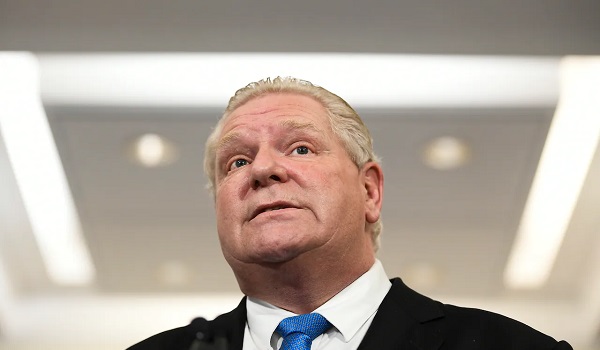Construction firms in charge of critical Ontario infrastructure projects complained of being cheated by the province
The Ontario government has been hit with scores of claims from construction companies that say they were left on the hook for money they spent to keep critical public infrastructure projects moving ahead during the pandemic.
Several of the firms have taken the province to court, where they are seeking hundreds of millions of dollars in damages.
So far, the province has reached settlements for 67 different claims, government officials said. However, the government will not say how much it paid in settlements or how many other claims it’s facing.
Despite declaring a province-wide state of emergency in March 2020 to slow the spread of COVID-19, several companies say the government refused to admit that the pandemic constituted an emergency for their projects — what the firms allege was a breach of contract. This emergency status would have entitled the companies to more money and time.
The province has argued in court that project agreements made construction companies responsible for added costs. As they negotiate claims, government officials say they are trying to shield taxpayers from runaway COVID-related expenses.
Details of settlements are ‘confidential’
Michael Lindsay, president and CEO of the provincial agency Infrastructure Ontario, said details about the settlements are “commercially sensitive” and “confidential.”
Lindsay said the pandemic presented “unprecedented realities” that project contracts did not fully anticipate. He said he is confident that a review of the agency’s response to COVID claims would show it is protecting taxpayers, while “acting reasonably to address the validated costs” experienced by the construction firms.
The public has a “right to know” how much the pandemic added to construction costs, said Matti Siemiatycki, director of the Infrastructure Institute at University of Toronto.
Temporarily withholding settlement details may protect the province’s position in negotiating ongoing claims, but that information should ultimately be released, Siemiatycki said.
“Having transparency is important, so that our community understands the costs of these mega projects, and can understand how public money is being spent,” he said.
Major P3 projects account for 17 settlements
Most of the 67 COVID-related claims were settled through dispute resolution mechanisms built into the projects’ agreements, Infrastructure Ontario said.
Seventeen of those settlements stemmed from major public-private partnerships (P3).
In P3 projects, a consortium of private companies inks a deal with the government, and typically delivers private financing, as well as project maintenance and operation. Governments have often touted the P3 model as a way to shift risks associated with large-scale projects from taxpayers to the private sector.
But those risks do not include “extraordinary circumstances like the COVID-19-pandemic,” said Jean-Louis Servranckx, president and CEO of Aecon Group, which is part of a consortium of companies suing the province.
The consortium had been hired in 2019 to widen a stretch of Hwy. 401, from Mississauga to Milton. The $640-million contract included an “emergency provision” that was standard across all of Ontario’s major P3 projects and should have been triggered by the pandemic, entitling contractors to more time and money to implement COVID-safety protocols and navigate supply-chain hiccups, the lawsuit claims.
“Nearly four years after the outbreak of the pandemic, we are still seeking fair and reasonable compensation for these costs,” Servranckx told the Star.
The province had deemed P3 projects “essential,” and released COVID guidelines for construction sites that mandated the sanitization of equipment, the social distancing of workers and other safety protocols.
However, to avoid triggering the emergency provision in its contracts, and “minimize its exposure to P3 contractors,” the province decided to refuse to acknowledge the existence of an emergency for its projects, alleges the consortium, which also includes developers Amico and Parsons.
“In formulating and implementing this strategy … the Ontario Crown … breached its obligations of honest and good faith performance,” the lawsuit alleges.
Infrastructure Ontario has not yet filed a statement of defence in the Hwy. 401 case, and declined to comment on the allegations, which have not been tested in court.
Eglinton Crosstown LRT project sparked court action
The companies building the Eglinton Crosstown LRT, another P3 project, have also taken the province to court. That consortium, called Crosslinx Transit Solutions, includes Aecon, which is also on the Hwy. 401 project, as well as ACS-Dragados, EllisDon and SNC-Lavalin.
In the fall of 2020, Crosslinx took legal action against Infrastructure Ontario and Metrolinx over their alleged repeated refusal to declare an emergency for the project. The consortium said the pandemic had left it grappling with new safety protocols, supply chain problems and absenteeism.
The provincial agencies disputed the claims. They argued that the $8.25-billion project agreement made Crosslinx responsible for risks associated with the pandemic. The agencies said they didn’t declare an emergency on the project because Crosslinx was already required to maintain a safe and healthy workplace, including implementing COVID protocols.
The case wound its way through various levels of court. In December 2021, the provincial agencies announced they had reached a $325-million settlement to resolve various disputes with Crosslinx related to the project, including COVID costs.
After it was sued by another consortium, the province came out swinging.
The lawsuit stemmed from a $616-million contract to widen a stretch of Hwy. 427, which wasn’t completed until September 2021 — a year behind schedule. The companies blamed the “long and torturous road to opening” on a series of alleged missteps by the government, including its “repeated” refusal to declare an emergency for the project during the pandemic.
Infrastructure Ontario attributed the delay to the companies’ “own poor execution and poor progress” and issued a counterclaim against the consortium for $11 million, court documents state.
The province and the companies agreed to take the dispute to arbitration, which “remains ongoing,” a spokesperson for Industry Ontario said.
An ‘expensive’ lesson?
While the province’s alleged refusal to declare an emergency on projects has rankled contractors, from the perspective of taxpayers, “the government did the right thing,” said James McKellar, professor emeritus at the Schulich School of Business.
Rather than giving contractors carte blanche on COVID costs, McKellar characterized this approach as “a big stick” that would have made contractors “come to the table a little more humble.”
NDP infrastructure critic Jennifer French (Oshawa) said the P3 claims — and the unknown amount spent to settle them — could be an “expensive” lesson in the dangers of moving away from traditional public financing.
“We’re now finding out that the risk is actually multiplying and falling back on us,” she said. “It’s very frustrating as a member of the public just to watch so many dollars disappear … We are not allowed to know where. We’re not allowed to know how much.”
In 2014, the province’s auditor general found that Infrastructure Ontario’s reliance on public-private partnerships had cost $8-billion more than traditional public financing. But the agency’s then-CEO pushed back against the finding, saying that number did not account for cost overruns and delays that large-scale publicly funded projects often incur.
Even before the pandemic, Infrastructure Ontario’s Lindsay said the province had been reviewing its contract models and making adjustments. Since COVID struck, he said the agency has made changes to all its contracts, including for P3 projects, “to provide a more predictable way to deal with the risks and the costs associated with pandemics moving forward.”
This article was reported by The Star












